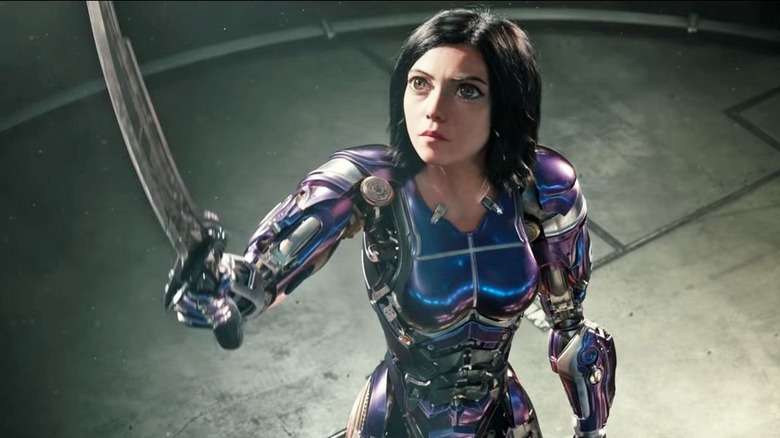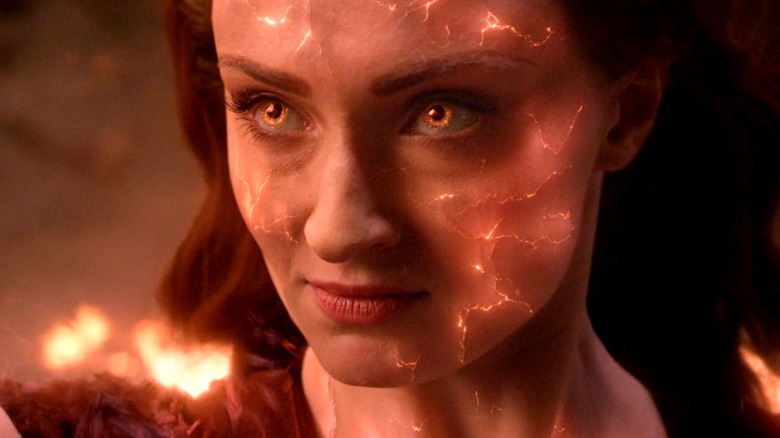How James Cameron And Alita Reportedly Set Dark Phoenix Up For Failure
The "X-Men" movie "Dark Phoenix" was hurt by upheaval at its studio, 20th Century Fox. The film was developed during the merger between Fox and Disney; in fact, "Dark Phoenix" was released on June 7, 2019, early into the new management's tenure. During that theatrical run, it made only $254 million on a $200 million budget, ultimately losing $133 million in the worst bomb of 2019.
It's tempting to think Disney undermined "Dark Phoenix." The movie was released as a lame duck, the last product assembled before all Marvel properties were back under Disney's umbrella. Marvel Studios would've doubtlessly preferred not to inherit a completed "X-Men" film, so that they could get to work on their own versions of the characters (even if the Marvel Cinematic Universe has brought back some faces from Fox's "X-Men" movies since).
However, The Hollywood Reporter indicates there was another player who helped doom "Dark Phoenix" — James Cameron.
Big Jim intervenes
With "Dark Phoenix," writer and director Simon Kinberg wanted to make a smaller, more personal movie, shifting away from the campy spectacle of the previous film "X-Men: Apocalypse." "['Dark Phoenix' was] big for off-season, too small for summer," an unnamed Fox Insider told THR. Thus, the film was first set for a November 2, 2018 premiere, then was pushed back to February 14, 2019 to accommodate reshoots. According to a scoop from Collider, the earliest Kinberg could reassemble his cast was September 2018, which would've left insufficient time for post-production. Thus, the months-long delay.
Meanwhile, James Cameron's passion project "Alita: Battle Angel" was also on the horizon. Cameron, a fan of the source material manga "Gunnm" by Yukito Kishiro, had been trying to get the movie made since 2000. He ultimately ceded directing to Robert Rodriguez so he could focus on the "Avatar" films, but he remained on as a producer and was obviously still invested in the film's success.
Initially planned for July 20, 2018, "Alita" was pushed back to December 21, 2018 (confirmed in February 2018). With this move, Cameron saw his baby heading for a slaughter. Released in December, it would face "Aquaman," "Bumblebee," and "Mary Poppins Returns" — compared to this triple threat, "Alita" had no name recognition and would fall through the cracks. So, Cameron reached out to Stacey Snider, then CEO and Chairman of 20th Century Fox, and asked her to delay "Alita" again to February. This would have the domino effect of pushing "Dark Phoenix" to the summer.
Over the objections of Kinberg, then President of Production Emma Watts, and "Dark Phoenix" producer Hutch Parker, Snider agreed to Cameron's lobbying. The schedule change was revealed to the public in September 2018.
Angelic rewards
Did moving release dates help "Alita"? Yes, yes it did.
According to Box Office Mojo, "Alita: Battle Angel" made $405 million on a reported production budget of $170 million. By the old Hollywood rule of thumb for profit (double the listed budget to account for advertising costs), the film landed somewhere between breaking even and barely reaching profit. International markets lifted the film, delivering over 75% of its gross ($319 million, compared to $86 million domestically).
These results surpassed expectations, since pre-release tracking indicated "Alita" could lose as much as $200 million. Two weeks before release, TheWrap reported box office analyst Daniel Loria's prediction: $25 million gross by Presidents' Day (it actually made $41 million) and a final domestic total of $45-50 million (see the aforementioned $86 million figure).
I'd say word of mouth helped the movie — the film maintains a passionate fanbase called the "Alita Army." I'm not quite as over the moon as them but I do fall in the pro "Alita" camp. It's a good, earnest blockbuster with a great lead character/performance.
The biggest competition "Alita" faced that weekend was "The Lego Movie 2: The Second Part," which had already been in theaters for a week by February 14, 2019. Comedy films "Isn't It Romantic" and "What Men Want" and the horror sequel "Happy Death Day 2U" rounded out the top five that weekend. It's hard to picture "Alita" coming in at no. 1 if it faced "Aquaman" (which took in $1.148 billion).
The Phoenix burns out
Four months later, "Dark Phoenix" came in second next to "The Secret Life of Pets 2." Could "Dark Phoenix" have bested the February competition? I wouldn't say no. It could've filled the role "Alita" ultimately did as the first action blockbuster of 2019. However, I doubt it would've had the legs "Alita" did — aside from being part of a dying franchise, it just wasn't as good a movie. If you won't take my word for it, compare the 66% on Rotten Tomatoes for "Alita" with the 22% for "Dark Phoenix."
Supporting my hypothesis, "Dark Phoenix" ultimately fell to fifth place in its second week and then tenth in its third. It probably didn't help that the film was released in the shadow of "Avengers: Endgame" (released wide on April 26, 2019). Rather than the superhero movie kick-off of 2019, "Dark Phoenix" felt like a half-baked aftertaste. "Alita," on the other hand, stayed in the top five until the week of March 15, 2019.
While Cameron's intervention helped "Alita," there was still uncertainty about whether Disney considered the film a sufficient success, even years after its release. Until 2023, that is. In April, producer John Landau told Screen Rant that "we're working on [an 'Alita'] sequel," with Rodriguez and star Rosa Salazar in talks to return. Cameron reiterated he's helping to develop the sequel(s) in a July interview with Forbes.
The better-than-expected returns, continued interest in the property, and Cameron's victory lap from "Avatar: The Way of Water" seem like they could be enough to push another "Battle Angel" across the finish line. Given the choice between an "Alita" sequel or another corporate and sterile blockbuster like "Dark Phoenix," I'll take the former every time.



